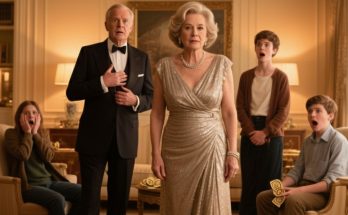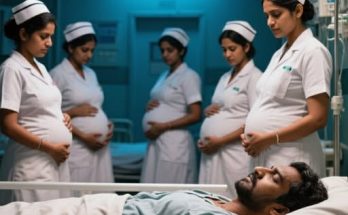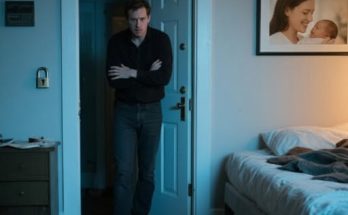As a penniless, fatigued college graduate, I saw an intriguing ad: “Companion needed for elderly woman.” Light duties. Quiet home.”
I got an interview right away by calling. My grandchildren, two well-dressed young adults, greeted me at the entrance. I met Mrs. Halbrook, weak and bedridden, with beautiful hair and fresh nail paint. Regal even when down.
I got the job that day.
After one day, the grandkids scarcely spoke to her. They lived with her but treated her like an old lamp no one wanted to throw out. It appeared they were merely waiting.
Things went strange.
My closed curtains would be open in the morning. Household items moved. Lost small items. Mrs. Halbrook denied it, and her grandkids never entered her chamber. I wondered whether I was losing it.
One night at dinner, the grandkids quietly announced their departure. Mrs. Halbrook grinned.
“I’ve got news too,” she remarked gently. I’m revising my will.”
They became magnificent angels the next morning. Fluffing pillows, baking cookies, and giving love like it was a job. She saw right through it.
A week later, she brought me into her room, gave me a sealed letter, and whispered:
It’s time. Rent a car. Midnight. In the garden when the lights go out.”
I blinked. “What then?”
She grinned. “We return everything.”
I didn’t get her meaning… But I agreed.
Midnight occurred. Silent garden. She instructed me to park under the huge oak. Dark house. Click—all lights out. The beat passed. Then the kitchen light came on. She appeared in the window with a cane, beaming like a child stealing out.
I ran to help her down the rear steps. “Should you walk?” Shocked, I whispered.
She said, “I haven’t been this sure about anything in a long time,” steadily with the cane. Let’s go.”
Her three large boxes of photo albums, letters, and souvenirs, which she had concealed under her bed, taped inside drawers, and buried in the garden shed, were in the backseat. “The only things that matter,” she said. “The rest they can fight over.”
I kept looking at her in the passenger seat as we drove away. She appeared alive. Not the calm woman I spoon-fed soup to a week earlier.
She showed me a secluded lakeside cabin in a forested part of the state I didn’t know existed. “Belonged to my sister,” she said. “No one knows. Excellent hiding place.”
I brought her inside, started a fire, and made tea. She recounted everything that night.
Grandchildren Miles and Tessa were reared more by her bank account than by their parents. After their mother, Mrs. Halbrook’s only daughter, died unexpectedly, she took them in. They got everything. Trust funds, tutors, trips.
But love? Gratitude? It never came.
She tried. Oh, she tried. They became polished shells focused on inheritance rather than family.
They volunteered to move in when she got sick and needed support. She started hopeful. Perhaps this would unite them.
But they ignored her, mocked her when they thought she couldn’t hear, and searched through her possessions. She pretended not to notice. Until one night, she caught them searching “how long does an old woman live after hip surgery” while drinking wine on the balcony.
Her breaking point.
So she pretended. Frailty. Forgetfulness. Confusion. She observed their behavior when they thought she was crazy.
And she planned.
She quietly consulted with a lawyer, updated her will, and packed away anything sentimental and real. The home? The cash? Give it to them. “They’ll eat each other alive over it,” she laughed into her drink. “Let karma pay.”
Her letter to me? She sent it to her lawyer. An event that releases the new will. She gave them enough to appear generous but not enough to purchase their devotion.
The rest? She gave. Charity her daughter helped at. A scholarship fund. And a small trust for me.
I nearly spilled my tea when I learned. “I can’t accept that,” I told her.
She answered, “You already did,” smiling mildly. I was treated like a person, not a bank account. That’s worth more than you think.”
Some months, we lived quietly in the cabin. We joked, she painted for the first time in decades, and I cooked. She told me of sneaking into jazz bars and dancing till morning as a child. Others didn’t know her like I did.
I found her asleep in her rocking chair by the window with a paintbrush in her lap one morning, smiling. Peaceful. Gone.
I wept like I lost a grandmother.
She requested no funeral. Just a letter to the lawyer set the last pieces in action.
The twist occurred then.
Miles and Tessa threatened to sue, so her lawyer called me. They were upset about the will, thinking I manipulated her. That I was a swindler.
However, the lawyer expected this. Mrs. Halbrook left a video message with the will.
It played at the reading: her bright, composed garden sitting.
“Watching this means you’re upset. Which is expected. No, I wasn’t senile. I wasn’t duped. I watched you two reveal yourselves. You convinced me. Considered me a burden. Like a barrier to your next vacation. I hope you realize what you lost wasn’t money.”
She ended with a gentle smile. “Be better.”
They fled red-faced and silent.
That was two years ago.
I’ve utilized the tiny trust she provided me to launch a care service that pairs companions with older individuals who need more than support. I named it Halbrook Hearts. Very little yet expanding. She comes to mind whenever I match someone who truly cares about their client.
I also kept her art. A simple lakeside landscape. My hallway has it. It makes me grin every time I pass.
She didn’t retract everything. She contributed greatly.
The lesson? Sometimes we ignore the finest storytellers. Greatest generosity. Sharpest minds.
And karma? It may take time. It never forgets.
Share if you’ve ever cared for someone who made you feel more than just “help,” or if someone astonished you with kindness. Like it. Pass it on.
You never know who needs to hear it today.



